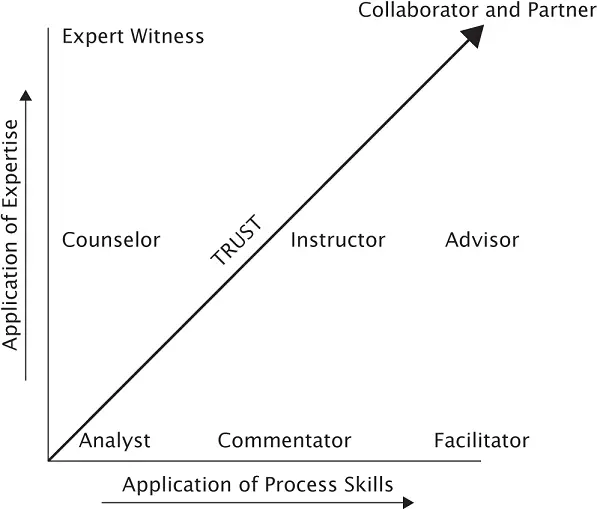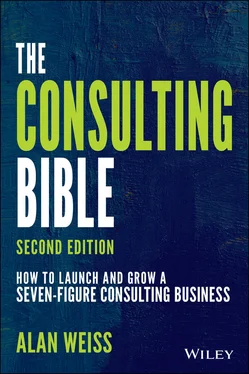A contractor or subcontractor is someone who performs work for the buyer at the buyer's direction and discretion, acting as a temporary employee, helping to implement work assigned by the client. A contractor is, in fact, a temporary employee, and is almost always paid by the time unit, usually hourly. They are peers of other, internal implementers. They bring no unique intellectual capital in most cases, nor is that what the buyer is paying for.
Many of you are having a case of the vapors or have gone to have a shot of Scotch, and I hope it's the aged stuff. But that's my story and I'm sticking to it. A consultant is a “brain,” a subcontractor is another “pair of hands.”
As some of you are thinking, many people calling themselves consultants simply are not. My educated guess over the past 30 years of good economies and bad ones is that there are only half as many true consultants as are claimed. 6 If we eliminate those between jobs just claiming to be consultants to save face, and those who are really subcontractors who are not sharing consulting DNA, we may have about 200,000 consultants in the United States, and perhaps twice that number globally.
And I believe only about 50 percent are sustaining decent lifestyles without additional support (their spouse's income, the oil well in the back yard, Aunt Tillie's bequest), and perhaps 20 percent are making high six‐figure and seven‐figure incomes. But that's a story for later in the book.
You may also have noticed, to your horror, that perhaps 90 percent of people calling themselves information technology (IT) consultants are, in reality, just paid help without the benefits.
If you are a pair of hands and not a brain, then you're not a consultant. You're probably a very inexpensive employee.

FIGURE 1.3Content, Processes, and Trust
I've personally mentored IT consultants all over the world, and have helped them to become true consultants, peers of their buyers, and charging for their value. But this is a tough sell. Most IT resources are simply performing tasks—writing code, fixing bugs, testing new relationships. They are not bringing their own intellectual capital or serving as partners and advisors to the chief information officer or chief technology officer (who should be their buyer).
Thus, the actual world supply of consultants is smaller than believed and the need is constantly growing, meaning that your potential to be in that top 20 percent is pretty high if you approach the profession with at least the diligence of a palm reader. That potential is growing as companies reduce residual talent. The greatest creator of net, new jobs in the U.S. (and in most countries) is small business. Large corporations reduce jobs through automation, attrition, and layoffs.
I've reproduced an earlier graph with more detail in Figure 1.3.
I advocated the diagonal approach earlier, and you can see that it's based on three factors, not just two:
1 The degree to which you bring useful content to the client.
2 The degree to which you bring useful processes to the client.
3 The degree to which you create trust with the buyer.
Content: The client is already immersed in content, which is often the problem—they are breathing their own exhaust. (I once had to remind officers at Mercedes‐Benz that they had auto experts falling out of the rafters, but that wasn't solving their customer service problems.) However, your ability to apply best practices from content you've been involved with elsewhere (and it doesn't have to be identical content, just analogous content) is highly valuable. The degree to which you move up the vertical axis depends on your interaction with the client, from sitting in a room by yourself to casual contact to public representation.
Process: You can superimpose processes that are universally applicable and that the client may be missing or simply not very good at. Most content‐heavy clients are not adept at the processes of conflict resolution, or priority setting, or strategy, simply because their time is overwhelmingly devoted to content matters. As you move along the horizontal axis, you once again move from “back stage” to “front stage.”
Trust: This is the key factor to propel you to the top right and become a true partner with your buyer. You can swiftly and efficiently build trust by:
Being introduced by a peer of the buyer.
Having a commercially published book(s).
Creating proprietary intellectual property and models.
Behaving and dressing like a successful businessperson.
Offering value early and frequently.
Being in the “public square” and known widely in the field.
Let me define trust: It is the honest‐to‐God belief that you're acting in the other person's best interest . That means that I'll accept even criticism well, because I know it's meant constructively. But if I don't trust you, I'll be wary even of compliments, worried about some hidden agenda on your part.
Consulting can take many forms, and it has in popular jargon. But I'm rejecting those who simply use the title because they are looking for full‐time work and those who are merely implementing as part‐time employees. That may sound elitist, but consulting is a noble profession, and we need to set some standards, since no one else seems to be doing so.
Let's see what success looks like.
It's easy to talk about “new levels” and “great success” and “turbo‐charge your career,” but what do those metaphors really mean? Do they mean more clients, more money, more time?
First, let's describe what constitutes a successful consultant, generically. He or she can be recognized by the following attributes:
A track record of helping improve clients' conditions over several years.
Buyer testimonials in writing and on video attesting to the specific results the work generated.
Working for firms and people beyond a narrow niche (and ultimately, as broadly as possible).
Working globally, even if solely remotely.
Delivering value by virtual and alternate means beyond physical presence.
Sufficient income to sustain one's desired lifestyle, including appropriate savings and planning.
A brand and presence in the market creating widespread knowledge of who the consultant is in that market and immediate credibility with prospects.
Peer respect and a place in the profession where the consultant is recognized and cited.
Intellectual property encompassing print, audio, video, and electronic distribution channels.
A personal life in sync with one's professional life and the discretionary time to pursue one's interests continually.
Regard as a “thought leader” with a strong brand.
One of the consultants I began mentoring about 15 years ago was making about a half million dollars at the time and working almost constantly, the stereotypical one‐man band. Today, his business is about $10 million; he uses five subcontractors on a regular basis, turns down business that doesn't interest him, has a pipeline extending out two years, and takes 12 weeks of vacation each year . Some of his typical vacations include swimming from one Caribbean island to another, and taking a month‐long private air tour of a dozen world sites.
You may not need millions of dollars of income 7 or three months of vacation, but you get the idea. You should be able to attain what you reasonably desire in life, and even beyond that. If I had ever had a business plan and created even stretch aspirations 30 years ago, I never would have imagined or predicted I'd be where I am today.
Читать дальше













